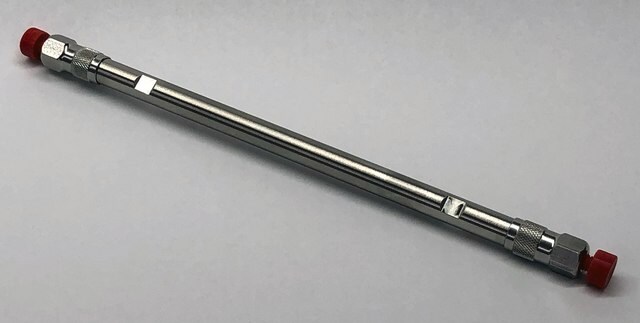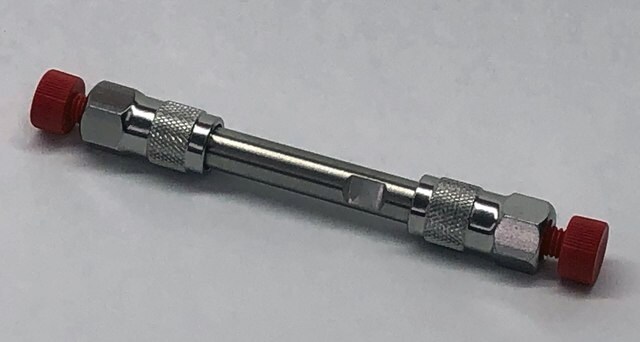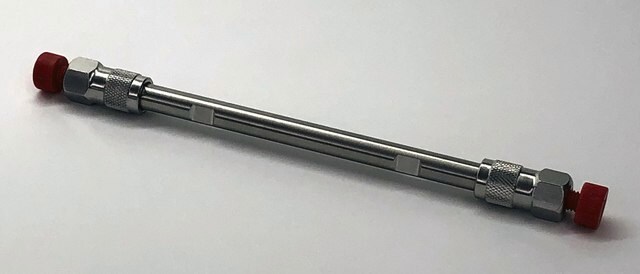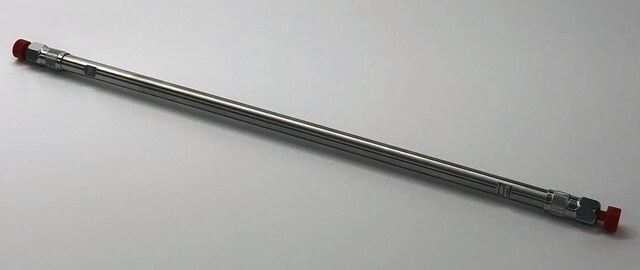53939-U
Ascentis® Express 90 Å HILIC (2.7 μm) HPLC Columns
L × I.D. 10 cm × 2.1 mm, HPLC Column
Sinônimo(s):
Core-shell (SPP) Fused Core Si HPLC column
About This Item
Produtos recomendados
product name
Ascentis® Express HILIC, 2.7 μm HPLC Column, 2.7 μm particle size, L × I.D. 10 cm × 2.1 mm
Materiais
stainless steel column
Agency
suitable for USP L3
linha de produto
Ascentis®
Características
endcapped: no
fabricante/nome comercial
Ascentis®
embalagem
1 ea of
Parâmetros
≤100 °C temp. range
600 bar max. pressure (9000 psi)
técnica(s)
HPLC: suitable
LC/MS: suitable
UHPLC-MS: suitable
UHPLC: suitable
C × D.I.
10 cm × 2.1 mm
área da superfície
135 m2/g
Impurezas
<5 ppm metals
matriz
Fused-Core particle platform
superficially porous particle
Grupo ativo da matriz
silica phase
tamanho de partícula
2.7 μm
tamanho de poro
90 Å
pH operacional
1-8
aplicação(ões)
food and beverages
técnica de separação
hydrophilic interaction (HILIC)
normal phase
Procurando produtos similares? Visita Guia de comparação de produtos
Categorias relacionadas
Descrição geral
Visit the Ascentis Express home page for more information on this new column technology.
Informações legais
Código de classe de armazenamento
11 - Combustible Solids
Classe de risco de água (WGK)
WGK 3
Ponto de fulgor (°F)
Not applicable
Ponto de fulgor (°C)
Not applicable
Choose from one of the most recent versions:
Certificados de análise (COA)
Don't see the Right Version?
If you require a particular version, you can look up a specific certificate by the Lot or Batch number.
Já possui este produto?
Encontre a documentação dos produtos que você adquiriu recentemente na biblioteca de documentos.
Artigos
A significantly improved HPLC-fluorescence method for DMB-NANA and -NGNA, and application of this method to compare 2 candidate biosimilar therapeutic proteins to their respective RMs.
The combination of ion-exchange SPE with the HILIC HPLC separation provides a novel approach for the testing of problematic bath salt compounds.
This article highlights the impact that sample matrix effects can have on LC/MS response and discusses two novel approaches to reduce it.
The benefit of HILIC over traditional reversed-phase chromatography is two-fold for both sample introduction and analyte detection. First, the high acetonitrile concentration of HILIC mobile phases allows for direct analysis of precipitated plasma samples without the need for additional sample solvent exchange. Second, the high acetonitrile content provides increased analyte response in positive ESI MS detection.
Protocolos
Separation of Heroin, analytical standard, ≥98% (HPLC); Cocaine hydrochloride, analytical standard; D-Amphetamine hemisulfate salt solution, 1.0 mg/mL in methanol, analytical standard, for drug analysis; (±)-3,4-Methylenedioxymethamphetamine hydrochloride solution, analytical standard, for drug analysis, 1.0 mg/mL in methanol
Separation of 3,4-Methylenedioxypyrovalerone HCl (MDPV) solution, 1.0 mg/mL in methanol (as free base), ampule of 1 mL, certified reference material; Buphedrone hydrochloride solution, 1.0 mg/mL in methanol (as free base), ampule of 1 mL, certified reference material; 3-Fluoromethcathinone hydrochloride solution, 1.0 mg/mL in methanol (as free base), ampule of 1 mL, certified reference material; Butylone hydrochloride solution, 1.0 mg/mL in methanol (as free base), ampule of 1 mL, certified reference material; Ethylone hydrochloride, 1.0 mg/mL in methanol (as free base), ampule of 1 mL, certified reference material; 4-Fluoromethcathinone hydrochloride solution, 1.0 mg/mL in methanol (as free base), ampule of 1 mL, certified reference material; Mephedrone hydrochloride solution, 1.0 mg/mL in methanol (as free base), ampule of 1 mL, certified reference material; Methylone hydrochloride, 1.0 mg/mL in methanol (as free base), ampule of 1 mL, certified reference material; Methedrone hydrochloride solution, 1.0 mg/mL in methanol (as free base), ampule of 1 mL, certified reference material
Nossa equipe de cientistas tem experiência em todas as áreas de pesquisa, incluindo Life Sciences, ciência de materiais, síntese química, cromatografia, química analítica e muitas outras.
Entre em contato com a assistência técnica


